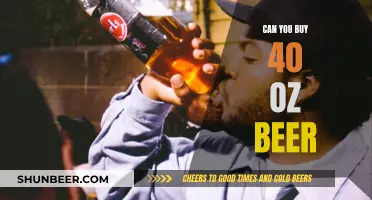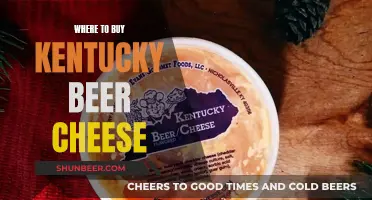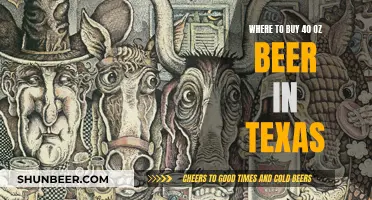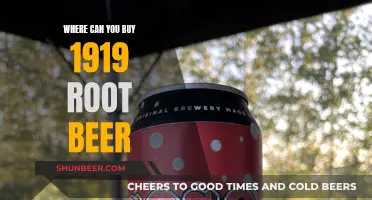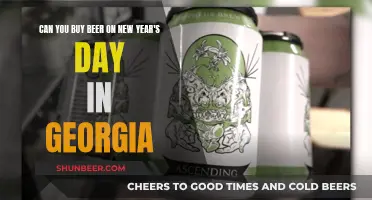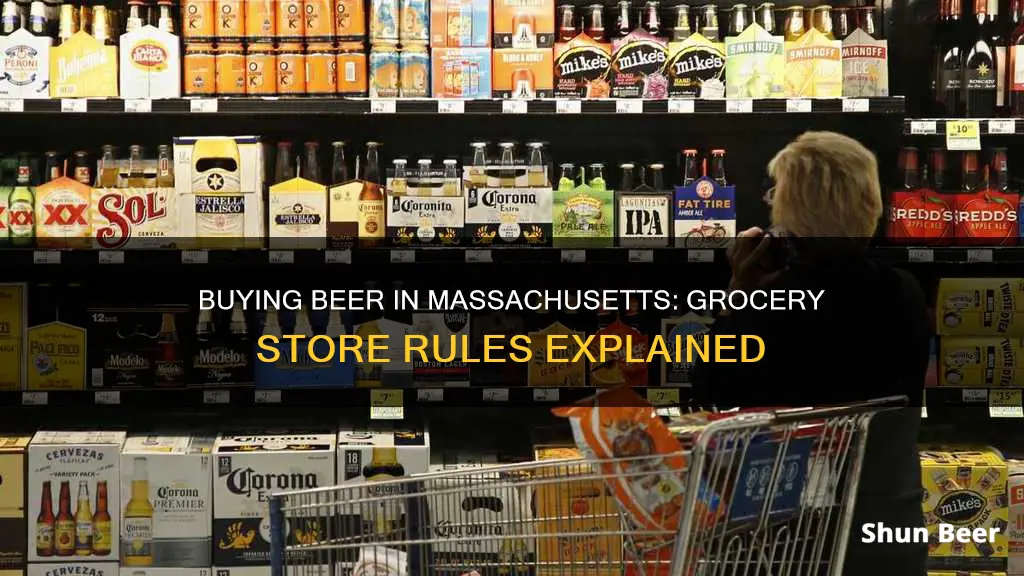
Massachusetts has some of the most restrictive alcohol laws in the United States. The state controls every aspect of alcohol, from production to consumption. While grocery stores in the state can sell beer, wine, and even spirits, the laws surrounding this are complex and vary from store to store. For example, some Trader Joe's stores in Cambridge sell beer and wine, while others do not.
| Characteristics | Values |
|---|---|
| Can you buy beer in grocery stores in Massachusetts? | Yes, but only in certain stores. |
| Can you buy wine in grocery stores in Massachusetts? | Yes, but only in certain stores. |
| Can you buy hard liquor in grocery stores in Massachusetts? | No. |
| What are the permitted hours for alcohol sales in grocery stores? | 8 a.m. to 11 p.m. Monday through Saturday. No alcohol sales before noon on Sunday. |
| Is there a limit to the number of liquor licenses a single business entity can hold? | Yes, the number of licenses varies depending on the year. |
| Are there dry townships in Massachusetts? | Yes, including Alford, Chilmark, Dunstable, Gosnold, Hawley, and Montgomery. |
What You'll Learn

Grocery stores can sell beer and wine from 8 a.m. to 11 p.m. Monday to Saturday
Massachusetts has some of the most restrictive alcohol laws in the United States. Time magazine ranked the state as one of the three states with the strictest alcohol laws, and the Boston Globe stated that "drinking laws in Massachusetts aren't Puritanical—they're worse".
Grocery stores in Massachusetts can sell beer and wine from 8 a.m. to 11 p.m., Monday to Saturday. On Sundays, no alcohol sales can begin before noon.
The state's alcohol laws are designed to give smaller, independent stores a chance to compete with larger, national chains. A restriction on the number of licenses a single business entity can hold means that only a limited number of stores per chain are allowed to sell alcohol. For example, in 2011, the law allowed a chain to sell beer and wine in no more than three of its stores in Massachusetts. This number increased to five in 2012, seven in 2016, and will go up to nine in 2020.
Some grocery stores in Massachusetts have found a loophole in the law by operating separate, small businesses within their stores that sell alcohol. For example, most Shaw's stores in Boston have a separate section for wine and beer, with a different checkout from the rest of the grocery store. Trader Joe's is another grocery store chain in Massachusetts that is well-known for selling beer and wine.
Massachusetts alcohol laws can be confusing and are subject to change, so it's always a good idea to check the most recent regulations.
Hudepohl Beer: Where to Buy and Enjoy It
You may want to see also

Grocery stores must have a license to sell alcohol
In Massachusetts, the sale of alcohol is governed by the Alcoholic Beverages Control Commission (ABCC). The ABCC is responsible for issuing licenses and permits for all manufacturers, wholesalers, and importers, as well as retailers, including grocery stores.
Grocery stores in Massachusetts are allowed to sell beer and wine, but not hard liquor. They can sell these beverages from 8 am to 11 pm, Monday through Saturday. On Sundays, no alcohol sales are permitted before noon.
The laws regarding the sale of alcohol in grocery stores in Massachusetts have evolved over time. Previously, an entity in Massachusetts could only own three liquor store licenses, which helped independent stores compete with larger chains. However, in 2011, a law was passed that gradually increased the number of licenses per corporation to seven in 2016 and will further increase to nine in 2020.
To obtain a license to sell alcohol, grocery stores must comply with the regulations set by the ABCC. This includes restrictions on the types of alcohol that can be sold and the hours during which sales are permitted. It is important to note that the laws and regulations regarding alcohol sales can vary from state to state, and even within different counties and cities within a state. As such, it is essential to stay informed about the specific laws and regulations in the relevant jurisdiction.
Mythos Beer: Where to Buy and Enjoy This Greek Beverage
You may want to see also

Grocery stores must check out alcohol purchases separately from groceries
In Massachusetts, grocery stores that sell alcohol are required to check out alcohol purchases separately from groceries. This is because the alcohol sections of these stores are technically separate, small businesses within the larger store. This means that if you're buying alcohol and groceries, you'll need to be prepared to spend a few extra minutes at the register, checking out your alcohol separately.
Massachusetts has some of the most restrictive alcohol laws in the country. Time magazine ranked the state as one of the three states with the strictest alcohol laws, and the Boston Globe described these laws as "worse than Puritanical". The state's alcohol laws are overseen by the Alcoholic Beverages Control Commission (ABCC), which controls every aspect of alcohol, including production, selling, and consumption.
One of the key restrictions in Massachusetts is the limit on the number of liquor store licenses that can be owned by a single business entity. This law was changed in 2011 to allow entities to hold up to five licenses, with an additional $5,000 state fee per license over three. The number of licenses has continued to increase over the years, reaching seven in 2016 and nine in 2020. However, this restriction has led to a situation where only certain locations of large chain grocery stores are licensed to sell alcohol. For example, Stop & Shop has alcohol sections in its Malden, Quincy, and Hingham stores, while other locations do not.
The restriction on liquor licenses aims to support independent liquor stores and prevent large national chains from dominating the market. Each municipality in Massachusetts has a limited number of liquor licenses, and the application process can be complex and time-consuming. The scarcity of permits and the associated costs often discourage grocery stores from obtaining licenses to sell liquor.
In addition to the license restrictions, there are also specific hours during which alcohol can be sold in Massachusetts. Grocery and convenience stores can sell beer and wine from 8 a.m. to 11 p.m., Monday through Saturday. On Sundays, no alcohol sales are allowed before noon. It is also illegal to sell alcohol on election days while the polls are open.
Colorado Sunday Beer Buying: What's the Deal?
You may want to see also

Grocery stores cannot sell hard liquor
Massachusetts has some of the most restrictive alcohol laws in the United States. Time magazine ranked the state as one of the three states with the strictest alcohol laws, while the Boston Globe commented that "drinking laws in Massachusetts aren't Puritanical—they're worse".
Grocery stores in Massachusetts are not permitted to sell hard liquor. However, they are allowed to sell beer and wine, but only between the hours of 8 am and 11 pm from Monday to Saturday. No alcohol sales are permitted before noon on Sundays.
The state's alcohol laws are designed to protect independent liquor stores from competition from large national chains. A restriction on the number of liquor licenses a single business entity can hold means that only a limited number of stores within a chain are permitted to sell alcohol. For example, only three Stop & Shop stores in Massachusetts can sell alcohol. This limit has been gradually increasing, with the number of licenses available to corporations rising to five in 2011, seven in 2016, and nine in 2020.
The Alcoholic Beverages Control Commission (ABCC) oversees all aspects of alcohol in Massachusetts, including production, selling, and consumption. The state has approximately 3,000 off-premise spirits licenses, with 1,800 of these belonging to standalone beverage alcohol stores.
Massachusetts has a population of around 6.9 million people, with 5.3 million within the legal drinking age bracket. Despite its smaller population, the state ranks ninth in terms of the most valuable spirits markets in the United States. The state sells approximately 56 million 9L cases of beer, 13 million cases of wine, and 7.8 million cases of spirits.
Colorado Nightlife: Beer Buying Hours
You may want to see also

Grocery stores cannot sell alcohol before noon on Sundays
Grocery stores in Massachusetts are permitted to sell beer and wine, but not spirits. However, there are some restrictions on when they can do so. Alcohol sales in grocery stores are prohibited before noon on Sundays. This also applies to restaurants and bars.
Massachusetts has some of the most restrictive alcohol laws in the United States. For example, it is illegal to sell alcohol on election days while polls are open, and happy hours are banned.
The state's alcohol laws are overseen by the Alcoholic Beverages Control Commission (ABCC), which controls every aspect of alcohol, from production to consumption.
The number of liquor licenses available in Massachusetts is limited, and this can make it difficult for grocery stores to obtain permission to sell alcohol. The state legislature changed the law in 2011 to increase the number of licenses that a single business entity can hold from three to five, with an additional $5,000 state fee per license over three. This limit has been increasing gradually, and as of 2020, businesses can hold up to nine licenses.
The restriction on the number of licenses available is designed to allow independent stores to compete with larger chain stores.
Stroh's Beer: Where to Buy and Enjoy It
You may want to see also
Frequently asked questions
Yes, you can buy beer in grocery stores in Massachusetts. However, the number of licenses a single business entity can hold is restricted, so not all grocery stores sell beer.
The law was changed by the state legislature in 2011 to increase the number of licenses from three to five, with a $5,000 state fee per license over three.
Beer can be sold from 8 a.m. to 11 p.m., Monday through Saturday. No alcohol sales are allowed before noon on Sundays.
Yes, it is illegal to sell alcohol on election days while the polls are open. Additionally, happy hours and bulk buy discounts for customers are prohibited in the state.


